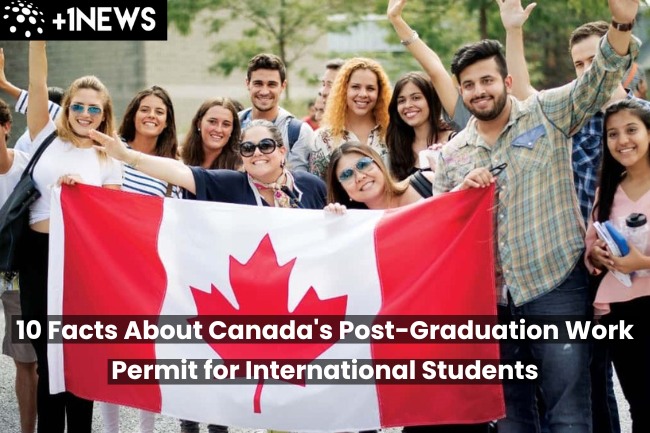If you’re an international student studying in Canada, there’s a valuable opportunity waiting for you. Canada’s Post-Graduation Work Permit (PGWP) program can be your ticket to gaining work experience and potentially becoming a permanent resident.
In this article, we’ll dive into 10 facts about Post-Graduation Work Permit.
Jump to:
1. Ticket to Permanent Residency
The PGWP can help make your dream of becoming a permanent resident in Canada a reality. Here’s how:
- The work experience you gain in Canada through this program is highly valued and can be a crucial factor in obtaining permanent residency.
- Many of Canada’s immigration pathways directly reward candidates with Canadian work experience.
2. Full-Time Student Status is a Must
To qualify for a Post-Graduation Work Permit, you must have maintained full-time student status throughout your academic program. Some exceptions apply due to the COVID-19 pandemic:
- Ensuring that you meet the criteria for full-time student status during your program is crucial.
- Exemptions may apply for students affected by the pandemic.
3. One-Time Application Only
You can apply for a PGWP only once, but there’s an exception related to passport expiry dates:
- If your permit’s length was limited due to the expiry date of your passport, you can apply for a work permit extension when you renew your passport to receive the full validity period for your PGWP.
- Remember, PGWPs can be applied for only once by any international student graduate, and returning to school does not grant the ability to apply for a subsequent permit if you complete a different eligible program.
4. Consider Alternative Work Permits
International student graduates who are eligible for other work permits besides the PGWP have options to continue working in Canada. Exploring alternative work permit options can be beneficial based on your eligibility and career goals.
5. Maintained Status Matters
Maintaining your legal status in Canada is essential, especially while waiting for a decision on your Post-Graduation Work Permit application:
- International students in Canada typically have temporary resident status, requiring them to leave Canada at the end of their authorized stay.
- You can apply to extend your authorized stay before it expires, allowing you to remain in Canada legally while awaiting a decision on your PGWP application.
6. Working While Your Post-Graduation Work Permit is Processed
If you’ve completed your program and meet certain requirements, you may be able to work full-time while your PGWP application is being processed.
To be eligible for this, you must have completed your program of study and meet the requirements for off-campus work without a work permit.
7. Timely PGWP Application
It’s essential to keep the timing in mind when applying for a PGWP. Your study permit expires 90 days after you complete your program, and you have 180 days to apply for a Post-Graduation Work Permit once you obtain proof of graduation.
To work in Canada if your study permit becomes invalid or expires before applying for a Post-Graduation Work Permit, you have two options:
- Leave Canada and apply for a PGWP overseas.
- Apply for international student status restoration (for a fee) and a PGWP.
8. Post-Graduation Work Permit with an Expired Study Permit
Even if your study permit has expired, there are ways to apply for a PGWP. You can either leave Canada and apply for a Post-Graduation Work Permit overseas or submit an “outside of Canada” application while physically staying in the country.
In the latter case, you must maintain visitor status until you receive the PGWP.
9. Ignore the 120-Day Letter
Post-Graduation Work Permit applicants often receive an auto-generated letter from IRCC, informing them that they have 120 days to keep working while a decision is being made on their application.
However, you can ignore this letter. If 120 days pass without a decision, you can simply request proof of authorization to work using the IRCC web form.
10. Spouse/Partner Work Permit
If you are a PGWP holder and wish to explore opportunities for your spouse or common-law partner to obtain a work permit, there’s a specific exemption known as the C41 exemption that allows for this possibility.
To be eligible under this exemption, the PGWP holder must meet the following three criteria:
The PGWP holder is authorized to work in Canada for at least 6 months:
This means that you, as the PGWP holder, should have a work permit that is valid for a minimum of 6 months from the time your spouse or partner’s open work permit is received.
The PGWP holder will be in a job classified under NOC 0, A, or B:
Your employment in Canada should fall under the National Occupation Classification (NOC) codes 0, A, or B. These codes typically represent management, professional, and technical occupations.
The PGWP holder is residing/plans to reside in Canada while employed:
To be eligible for this exemption, you, as the PGWP holder, should either currently reside in Canada or have plans to reside in the country while employed.
Read More: Bringing Family to Canada
Conclusion
Canada’s PGWP program offers a unique pathway to work experience and potential permanent residency for international students. Ensure you meet the requirements and take advantage of this valuable opportunity.














